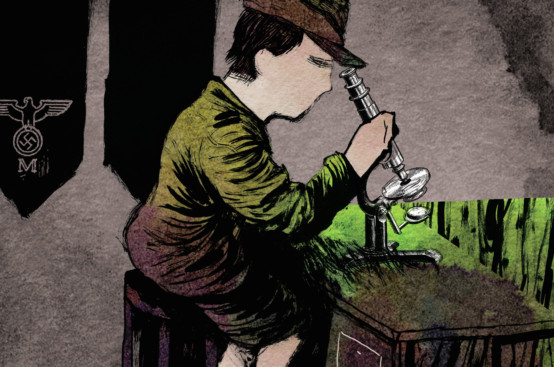
All for Nothing
By Walter Kempowski, Granta Books, 352 pages, £15
This novel by the German writer Walter Kempowski, who died in 2007, is influenced by his mighty collection of diaries, letters and memoirs, “Das Echolot” (Echo Soundings), a 10-volume collage of the collective German experience throughout the Second World War. He began work on the project after finding some old photographs and letters lying in the street, and deciding to “bend down and pick up” the testimonies of all, from concentration camp prisoners to the Reich’s high command — leaving nothing out, simply presenting.
“All for Nothing”, his last novel, translated by Anthea Bell, resounds with that same love for the pathos of detail, the same determination to bear witness to the entire human experience. The book’s characters may see each other as Jew, Nazi, peasant, aristocrat, Pole, foreigner, but the writer steadfastly refuses to see any of them as less than fully human.
It follows the fortunes of a family in East Prussia, between January and May 1945. The once rich Von Globigs live in run-down grandeur on the Georgenhof estate, an old shambles of a place not far from the eastern front, bracing itself against the bitterness of a terrible winter. The Georgenhof sits, along with a modern housing estate, in the middle of miles of snow, its gate askew, the summer drawing room ice-cold and full of dumped packing crates. Dead flies lie on their backs in the teacups on the dresser. Twelve-year-old Peter, a quiet boy, hangs around playing with his microscope, trying to get out of his Hitler Youth duties and avoiding Drygalski, the petty official who oversees the estate across the road.
Drygalski, mourning a dead son and caring for a sick wife, is a puffed-up bureaucrat obsessed with his own importance. He keeps a constant suspicious eye on the Georgenhof’s Polish handyman and two Ukrainian maids. There are a dog and a cat, a few chickens, and, on the edge of the wood, the small grave of Peter’s little sister Elfie, who died two years before. Peter’s father Eberhard has a desk job in Italy far from the front, and his mother, Katharina, is a placid beauty, vague and naive, withdrawn to the point of vacancy. The real brains of the household is Auntie, “a sinewy old spinster with a wart on her chin”.
Various travellers arrive: a political economist, a young violinist, a touring artist recording buildings and bridges for posterity. Each brings news: a blown-up bridge, distant cannon-fire. Rumours abound, but the wireless says everything is under control and the trains still run, supplying the Reich with the products of Ukraine and Byelorussia, where even the topsoil has been stripped and sent west.
The novel builds gradually, dreamily at times, with simple prose and lots of short sections, a quiet undercurrent of growing unease getting steadily stronger, always ignored, put aside till tomorrow. After all, how does one leave a life? No one can quite make the radical decision to go, even as the trickle of refugees from the east becomes a stream, passing stolidly between the Georgenhof and the houses opposite, bearing with them the loss of what they have left behind and the few small, saved details of their lives.
Kempowski uses detail like a repeating phrase in music, and there is a musical quality also in the movement of the book as a whole, from its quiet beginning through the relentless build to its massively impressive climax. The repetition is skilfully fed into the narrative to create a gradual deepening of tone. People are revealed slowly by the things they cling to. The trivial becomes profound as objects take on huge emotional significance: a Persian lamb cap, a meerschaum pipe, a stamp album. Memories are also possessions, of course, and the mundane ones, endlessly recurring, are equally poignant.
Inevitably, the Von Globigs’ reality is overtaken by war. The change has the suddenness of nightmare, and is made all the more powerful by the fact that the style remains precise, a simple recounting of facts, the worst and the best of it. “People’s intentions are never unequivocal,” Kempowski once said, and his observations of human foibles, fears and weaknesses are honest and humane. “All for Nothing” is a beautiful, forgiving and compassionate book that looks beyond the futile divisions people make between themselves. It reaches its last devastating line with poetic sensibility and the grace of a classical tragedy, confirming Kempowski as a truly great writer.
–Guardian News & Media Ltd
Carol Birch’s “Jamrach’s Menagerie” is published by Canongate.









